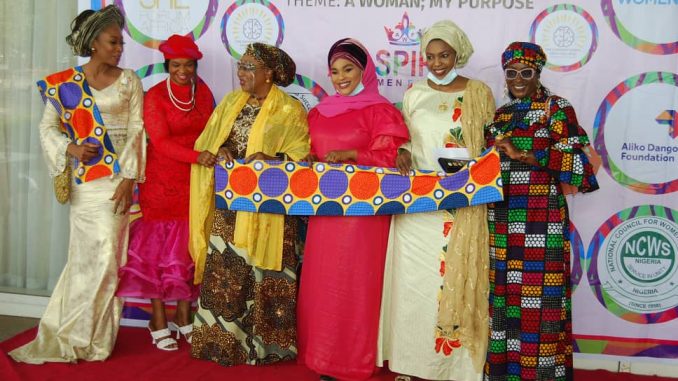
By DAPO FALADE
Nigeria’s First Lady, Mrs Aisha Buhari, has admonished women groups in the country to work hard towards the emancipation of the female folk, young and old, so that they can contribute their quota to nation building.
She stated this in Abuja at a conference organised by Aspire Women Forum (AWF), a non-governmental organisation (NGO) founded by a frontline female activist, Mrs Zainab Marwa-Abubakar.
While urging Nigerian women not to be discouraged, the First Lady advised them to continue to pick up challenges which will build them as well as empower themselves to aspire to greater heights.
Represented by her Special Adviser, Dr Hajo Sani, at the event, the First Lady later launched the NGO’s quarterly magazine and also unveiled the logo of the Aspire Women Network Project.
The President/Founder of AWF, Barrister Zainab Marwa-Abubakar, pointed out that the NGO was aimed at promoting the interest of women, while advising them to always believe in their abilities and strive for happiness through living a purpose filled life.
“The Happy Conference was borne out of the idea that every woman has a right to the pursuit of happiness. We chose this focus because there is a growing rate of suicide, murder, despondency, hopelessness and drug abuse among Nigerian women.
“This, coupled with the recent COVID-19 pandemic, has caused women to develop fear, anxiety and depression”, she said.
She also added that the mission of the AWF is to be “the foremost forum for igniting gender equity by advocating and engaging in the areas of
motivational behavioural coaching (MBC), politics and financial inclusion.
“To encourage positive aspirations and a mindset reset for success thus creating a new intellectually liberated generation of women and girls.”
Also speaking at the conference, former EFCC chairman and founder, Women Youth Children and Crime Organisation, (WYCCO), Mrs Farida Waziri said “a woman’s position is now associated with development and giving a woman a position in any country is like giving the nation the best. As such, we must be seen as women who want to advance not only for women but for the country we live in.”
In her remarks, Minister of Humanitarian Affairs, Disaster management and Social Development, Sadiya Umar Farouk, said the aspire women forum is a practical demonstration of what women can do for families, friends and the nation.
She charged all women to contribute their quota irrespective of age, tribe and religion in order to make Nigeria great.
Hon. Khadija Bukar Ibrahim, a member of the House of Representatives representing Damatura/Gujba/Gulani/Tarmuwa federal constituency, Yobe State, commended AWF as a platform for ensuring women’s voices are heard.
Hon. Abike Dabiri Erewa, chairman/Chief Executive officer, Nigerians in Diaspora Commission (NIDCOM), said “women are seen as multi-tasking especially when building the home, hence the society by extension” and called on Nigerian women to be fulfilled in finding their purpose in life.
The Executive Director of Nexim Bank, Hon. Stella Okotete, observed that “as women we face a lot of enormous challenges particularly in politics. It is very tough surviving the political terrain in Nigeria.”
She therefore urged women to find ways to make themselves happy in any situation, adding; “Aspire Women is a network of women which provides togetherness and that must be replicated by joining the Aspire Women Network.”
Hajiya Hadiza Aminu, the Coordinator of United Nations Spotlight Initiative, also stated: “We at the United Nations support women in every aspect of life. Aspire Women Forum connects every woman, therefore there is a need for women to come together and support and connect with the Forum.”
The theme of The Happy Conference was “A Woman: My Purpose.” It was a one day interactive session with over 350 women and young girls from government secondary schools in FCT and 88 organisations.

Leave a Reply